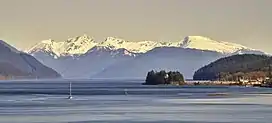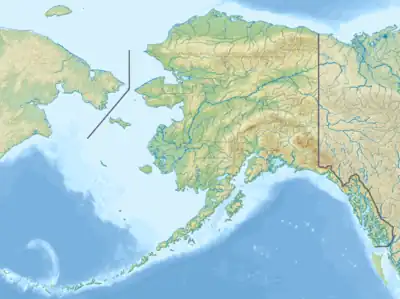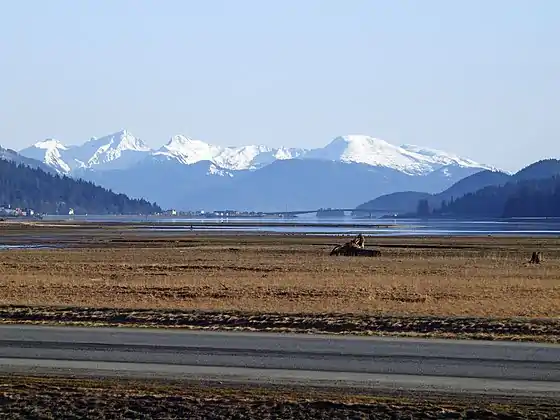Arthur Peak
Arthur Peak is a 3,650-foot (1,113 m) elevation mountain summit located in the Coast Mountains in the U.S. state of Alaska. It is situated immediately east of Taku Harbor, and 25 mi (40 km) southeast of Juneau, on land managed by Tongass National Forest. Although modest in elevation, relief is significant since the peak rises up from tidewater of Limestone Inlet along Stephens Passage in 1.3 mi (2 km).[2] Its nearest higher neighbor is Peak 3800, 1.85 mi (3 km) to the northeast.[3] This geographic feature was named in 1888 by Lieutenant Commander C. M. Thomas of the U.S. Navy.[4]
| Arthur Peak | |
|---|---|
 Arthur Peak is the snow-capped mountain on right | |
| Highest point | |
| Elevation | 3,650 ft (1,110 m)[1] |
| Prominence | 700 ft (210 m)[1] |
| Parent peak | Peak 3850[1] |
| Isolation | 1.84 mi (2.96 km)[1] |
| Coordinates | 58°03′09″N 133°58′33″W[2] |
| Geography | |
 Arthur Peak Location of Arthur Peak in Alaska | |
| Location | Tongass National Forest Juneau Borough Alaska, United States |
| Parent range | Boundary Ranges[3] Coast Mountains[2] |
| Topo map | USGS Taku River A-6 |
Climate
Based on the Köppen climate classification, Arthur Peak has a subarctic climate with cold, snowy winters, and mild summers.[5] Weather systems coming off the Gulf of Alaska are forced upwards by the Coast Mountains (orographic lift), causing heavy precipitation in the form of rainfall and snowfall. Temperatures can drop below −20 °C with wind chill factors below −30 °C. The month of July offers the most favorable weather for viewing and climbing Arthur Peak.
Gallery
 Arthur Peak right of center, with Peak 3850 to left
Arthur Peak right of center, with Peak 3850 to left
References
- "Arthur Peak - 3,650' Alaska". listsofjohn.com. Retrieved 2020-04-04.
- "Arthur Peak". Geographic Names Information System. United States Geological Survey, United States Department of the Interior. Retrieved 2020-04-04.
- "Arthur Peak, Alaska". Peakbagger.com. Retrieved 2020-03-28.
- Dictionary of Alaska Place Names, Donald J. Orth author, United States Government Printing Office (1967), page 88
- Peel, M. C.; Finlayson, B. L.; McMahon, T. A. (2007). "Updated world map of the Köppen−Geiger climate classification". Hydrol. Earth Syst. Sci. 11. ISSN 1027-5606.
External links
- Weather forecast: Arthur Peak